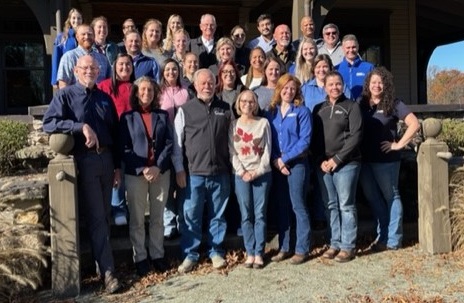 The 20th gathering of the SBS Affiliated Laboratories returned to Chesapeake City, Maryland on November 7th & 8th. Each year we meet to review procedures and policies, share information and experiences, discuss recent developments in the industry and set plans for the future. Our affiliate network is ever expanding as we add more affiliate members to our group. In the past few years we have welcomed two new affiliates in the state of Oregon. They are Dr. Ryan Ferris of Summit Equine and Dr. Thomas Timmons of Rogue Equine Hospital.
The 20th gathering of the SBS Affiliated Laboratories returned to Chesapeake City, Maryland on November 7th & 8th. Each year we meet to review procedures and policies, share information and experiences, discuss recent developments in the industry and set plans for the future. Our affiliate network is ever expanding as we add more affiliate members to our group. In the past few years we have welcomed two new affiliates in the state of Oregon. They are Dr. Ryan Ferris of Summit Equine and Dr. Thomas Timmons of Rogue Equine Hospital.
This year, three guest speakers were invited to join our meeting to discuss various scientific topics related to equine reproduction. The passion each of them has for their niche in the industry is infectious which led to many great questions and discussions after each presentation.
- Dr. Leo Brito, DVM, PhD is a Theriogenologist and Assistant Professor at the University of Pennsylvania. He also serves as the Director of the Hofmann Center for Animal Reproduction located near the main New Bolton Center campus in Kennett Square, Pennsylvania. He offered the group his expertise on the topic of “Quality Control and Assurance for Semen Production Laboratories”. Dr. Brito had previously led the development and implementation of such systems for a large commercial bull stud and an international network of bovine semen sexing laboratories. He also led a collaborative research study between SBS and The University of Pennsylvania investigating the efficacy of antibiotics in equine frozen semen extenders. The study demonstrated that the combination of antibiotics used by SBS and its affiliates in freezing equine semen were effective in controlling bacterial growth and did not negatively impact sperm quality. This was an important and timely finding since the European Union recently altered their requirements to specify which antibiotics can be utilized in extenders for freezing equine semen intended for import into the European Union.
- Dr. Camilo Hernandez-Aviles, DVM, PhD is a member of the Section of Theriogenology in the Department of Large Animal Clinical Sciences at Texas A&M University. He spent several years under the direction of Drs. Varner, Love and Terje Raudsepp during his doctoral program. His research interests are related to stallion fertility with an emphasis in stallion sperm physiology and cryobiology, and the improvement of techniques for stallion sperm analysis and storage. He gave two presentations about the “Evaluation of Frozen/Thawed Stallion Sperm: Concepts Beyond Sperm Motility” and “Stallion Sperm Freezing Factors Associated with Post-Thaw Quality and It’s Use for Assisted Reproductive Technologies (ART) in the Mare”.
- Dr. Katrin Hinrichs, DVM, PhD, DACT is a Diplomat of the American College of Theriogenologists, Professor of Reproduction and Equine Medicine, Chair of the Department of Clinical Studies - New Bolton Center at the University of Pennsylvania School of Veterinary Medicine and leads the Penn Equine Assisted Reproduction Laboratory (PEARL). PEARL performs both basic research and clinic work in equine assisted reproduction. While at Texas A&M University prior to coming to Penn, Dr Hinrichs was a pioneer in development of the techniques for oocyte aspiration and intra-cytoplasmic sperm injection (ICSI) currently used widely in the equine industry. We were very fortunate to have Dr. Hinrichs take time from her busy schedule to present her groundbreaking research in equine in vitro fertilization (IVF). Her group is the first to develop a reliable, efficient, and repeatable system to achieve live foals from true in vitro fertilization in the horse. She shared with us how they achieved this remarkable success and their plans to continue to improve the process.
 Also, during our meeting Dr. Ed Squires and Paul Loomis gave us an overview of numerous recent research papers on stallion reproduction published in scientific journals. Dr. Scofield led the group in a lively discussion on best practices about how each affiliate member handles different aspects of the services we offer. This included many topics ranging from frozen semen storage and distribution practices to what paperwork is required for incoming horses, health testing requirements, methods of AR management, billing practices, and elements of breeding soundness exams for stallions.
Also, during our meeting Dr. Ed Squires and Paul Loomis gave us an overview of numerous recent research papers on stallion reproduction published in scientific journals. Dr. Scofield led the group in a lively discussion on best practices about how each affiliate member handles different aspects of the services we offer. This included many topics ranging from frozen semen storage and distribution practices to what paperwork is required for incoming horses, health testing requirements, methods of AR management, billing practices, and elements of breeding soundness exams for stallions.
We are thankful to Booth Farwell and Amanda Compton of Merck Animal Health for sponsoring our evening dinner at the Chesapeake Inn where we enjoyed delicious appetizers, wonderful seafood, and great conversation. Once again it was a successful event! After a short hiatus, it was nice to all be back together to meet both new and old friends. More importantly, we continue to reaffirm the dedication we all share to being an integral part of improving the equine breeding industry and ushering it toward the future.


Log in to join the conversation.